
Features
Top 10 Under 40: Our industry is in great hands
Our 2024 top 10 list celebrates the future leaders of the aggregate and roadbuilding industries.
December 2, 2024 By Mike Lacey
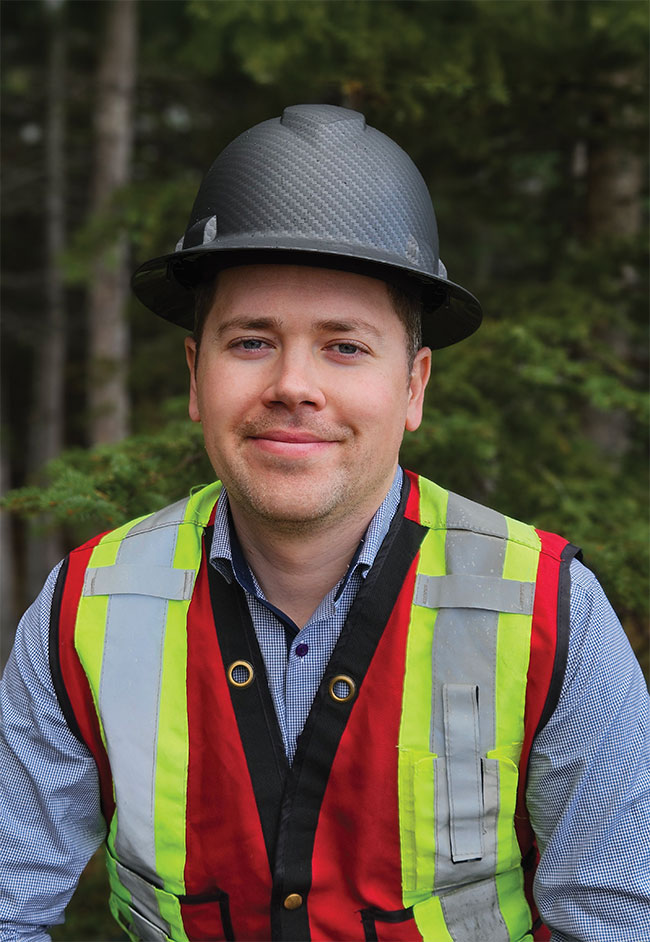
Every year, Rock To Road celebrates 10 of the aggregate and roadbuilding industries’ young professionals rising up the ranks.
This year, our 10 winners represent a broad cross-section of the industry. We were able to speak with each of them about why they got into this industry and what advice they have for young people entering the workforce.
Congratulations to all the winners.
Ravinder Sandhu
General Manager Ready Mix Concrete
Lafarge
Vancouver, B.C.
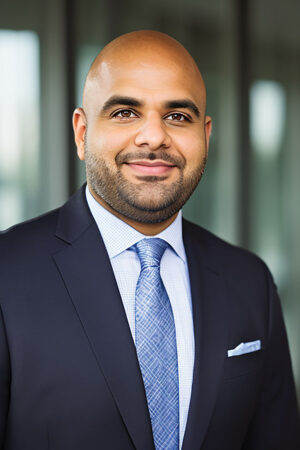 Ravinder Sandhu’s love of construction was born when, as a 10-year-old boy, he would travel with his father to jobsites.
Ravinder Sandhu’s love of construction was born when, as a 10-year-old boy, he would travel with his father to jobsites.
“My dad was a single-family-home builder and I spent a lot of time working with him on job sites doing any work that I could help with,” he says. “Getting my hands dirty and seeing something tangible take shape after a day’s work was what initially attracted me to construction.”
As he learned how to do rebar installs, insulation, waterproofing and landscaping, the area of civil engineering caught his
attention.
“I would often interact with the civil and geotechnical engineers as well as the city inspectors, reviewing plans and drawings,” he explains. “Seeing a two-dimensional plan take shape in real life got my attention.”
Sandhu completed a Civil Engineering diploma in 2007 and, with the advice of his older brother, that same year found work with Lafarge as an order taker in the ready-mix concrete dispatch office.
“I applied to be a technician in Lafarge’s Quality Control department,” he explains. “During my interview the operations manager and quality managers asked whether I really wanted to test concrete or if I would consider working in the dispatch office, taking orders and ensuring they met technical and performance specifications for project needs.”
His plan was to work at Lafarge for two years and then go back to school to pursue a degree in civil engineering.
“One year into my work with Lafarge, my father passed away. I became financially responsible for everything at home and returning to school was no longer an option. I chose to fully commit to Lafarge and take on any challenge put in front of me,” he says.
Sandhu quickly moved up the company’s ranks. He served as logistics supervisor for Metro Vancouver, playing a vital role in supplying concrete for major projects like the Canada Line and Olympic Village during the Olympic construction boom. He also served as project co-ordinator for the Port Mann and Highway 1 (PMH1) Project, managing the supply of concrete for the bridge, highway interchanges, and precast yard.
Following that, he was promoted to plant manager of Lafarge’s largest concrete plant in Western Canada, where he oversaw production, delivery and fleet maintenance.
After three years, he was promoted again to operations manager, responsible for six Lafarge ready-mix plants in Metro Vancouver, managing 125 personnel and a fleet of 90 trucks.
Since 2023 he has served as general manager Ready Mix Concrete in Vancouver. He is responsible for all concrete operations, sales, quality and logistics for the Metro Vancouver area. He oversees a business of nearly 200 union and non-union personnel, six production facilities and a fleet of 120 mixer trucks.
Sandhu says what he enjoys most about his job is his involvement in projects that shape the city.
“While I may not be the one on a jobsite swinging the hammer, I have a lot of pride in knowing that through Lafarge, we are contributing to new buildings, hospitals, malls and bridges,” he says. “I find that in this industry and in Lafarge, I am surrounded by like-minded people that love challenges and will find a way to get the job done, no matter what.”
Connor Fulton
Estimator/Foreman/Radiation Safety Officer
BR Fulton Construction
Renfrew, Ont.
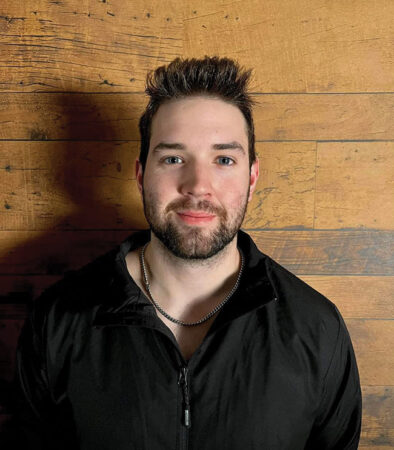 Connor Fulton has been involved in the road construction industry his entire life.
Connor Fulton has been involved in the road construction industry his entire life.
“I love construction,” he says. “I grew up in that work environment ever since I was very young when my family lived in our first house right beside our gravel pit.”
At his family-owned road construction business in Renfrew, Ontario, he wears many hats and is always quick to offer a helping hand where needed.
“Ever since I was able to start working and contribute to the company I got working and wanted to help the family business continue to succeed,” he says. “I enjoy the family aspect of my job, having my whole family together in this business makes all our jobs enjoyable but also pushes us to want to better the business. I also enjoy the variety of areas of work that I need to do under this job, it makes every day different and also brings on new challenges.”
In his last year of high school, he received the Janet Wilson Citizenship Award, which earned him a full college scholarship. Fulton made good use of it and graduated from Algonquin College with a diploma in Construction Engineering in 2021. In 2023 he became a Radiation Safety Officer and then, in 2024, he was Flatwork Certified, AZ licensed and completed Surface Miner.
Today he serves as an estimator, foreman and radiation safety officer with the company.
“All the titles of my job are equally important to me and I’m proud of them all because they all hold an extremely important value in this company in their own way,” he says.
“Being a radiation safety officer allows our company to handle, store and use radiation tools and devices, and allows me to train workers in our company if they want to handle anything with radiation. It also allows us to conduct and use a compaction testing device on road jobs when testing road compaction and culverts. Having my AZ licence gives me an option to jump in a truck if we need an extra driver in certain situations. Being Flatwork Certified allows our company to be able to pour concrete for townships and also shows that someone that’s doing the pour has proper training/understanding.”
When away from work, Fulton also finds time to coach the U14 Upper Ottawa Valley Aces hockey team and run the D-Stride
Hockey School.
For those entering the industry, he recommends remembering you don’t need to learn everything at once.
“It’s a process that has steps to it and it takes time. Everyone learns at different speeds. What matters is do you want to learn more and take the challenges that face you ahead because it will make you better and wiser in the future.”
Pejoohan Tavassoti
Assistant professor and Jr. Norman W. McLeod Chair in Sustainable Pavement Engineering at Department of Civil and Environmental Engineering at the University of Waterloo
Waterloo, Ont.
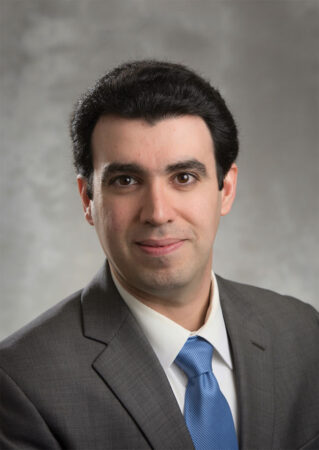 As a child, Pejoohan Tavassoti was amazed by the transformation happening in the city he grew up in.
As a child, Pejoohan Tavassoti was amazed by the transformation happening in the city he grew up in.
Everywhere he looked, there was rapid change.
“You’d walk past nearly every type of project imaginable — from renewing water mains and sewage systems to building new roads, bridges, and expanding residential and industrial areas,” he remembers. “As a child, I was fascinated by the complexity of the work, the equipment, and the sheer activity. But more than that, I noticed how these projects directly impacted, or sometimes failed to impact, the daily quality of life around me.”
It was this experience as well as conversations with his brother, an architect, that led him into the field of civil engineering.
“I was genuinely convinced that this field offered a way to make a positive impact on people’s lives and contribute to improving
communities,” he explains.
However, that impact didn’t come into full view until the end of his undergraduate studies. At the time, he was working on the design of a road with known safety issues.
“Late one night, as I was working on the geometric design of that section, I received devastating news. A very close friend of mine had been involved in a fatal car accident on that very road. Tragically, everyone in the vehicle, except for a young baby, lost their lives,” Tavassoti says. “The shock of that moment still lingers. I couldn’t help but think, ‘if only someone had acted on this sooner.’ From that point on, I made it my mission to dedicate a significant part of my life to learning as much as I could about transportation engineering, with the hope that my work could one day help save even a single life.”
After obtaining his PhD in Civil Engineering from Pennsylvania State University and working at the Thomas D. Larson Transportation Institute as an assistant research professor, he joined the University of Waterloo. His research revolves around promoting sustainability and resilience of the transportation infrastructure, focusing on an enhanced pavement engineering, design, and materials characterization framework for both flexible and rigid pavements.
He explains civil engineering is about creating solutions that impact society, whether its designing infrastructure or finding ways to have a more sustainable built environment.
He has authored or co-authored more than 50 peer-reviewed articles, as well as several technical reports and guidelines for the public and private sectors.
He is the vice chair of the Ontario Asphalt Expert Task Group (OAETG), where he is working with other experts to address some of the pressing issues affecting the quality of the pavement network in Ontario. Since 2018 he has worked with the Centre for Pavement and Transportation Technology (CPATT), where he currently serves as associate director. He is also a member of the International Union of Laboratories and Experts in Construction Materials, Systems and Structures.
However, teaching and supervising undergraduate and graduate students is what drives him.
“Watching students grasp complex concepts and apply them to real-world problems is incredibly rewarding. Being involved in research that pushes the boundaries of what’s possible in engineering also keeps me constantly learning and engaged,” he says. “Ultimately, it’s the combination of teaching, mentoring, and advancing knowledge that I find most fulfilling.”
He advises people to find their true passion and align it with what they do. Don’t settle, he says, and never stop trying to have a positive impact on the world and those in it.
“During my undergraduate years, I was fortunate to have three mentors among my professors. Their guidance and mentorship, along with their technical expertise, played a significant role in shaping both my personal and professional life,” he says. “No matter what stage you’re in, seek out mentorship, be open to improvement and, when the opportunity arises, strive to be a good mentor yourself.”
Maraya DeGrandis
Managing Director for DeGrandis Concrete Pumping and Vice President Strategic Initiative of Joseph Group
Brantford, Ont.
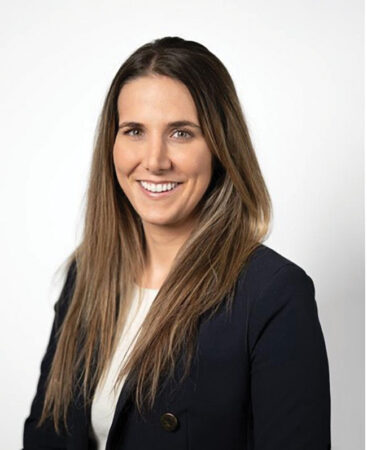 Construction and concrete are in Maraya DeGrandis’ DNA.
Construction and concrete are in Maraya DeGrandis’ DNA.
“My father used to sell cement for The Miller Group and later opened up his own ready mix plant — Brantford Ready Mix — and in five years grew the business with his partner to five plants, multiple gravel pits and 94 ready mix trucks,” DeGrandis explains.
In 2007, Brantford Ready Mix was sold but her father kept two pumps. That would grow into DeGrandis Concrete Pumping.
DeGrandis joined the company in 2020 after earning her Master of Business Administration from Ivey Business School (she had already earned a Bachelor of Arts degree in Honours Business Administration in 2014 at Ivey Business School).
“I knew the industry was changing rapidly,” she explains. “There were increased regulations and embracing technology was becoming essential to success and growth. My dad asked if I could assist and I gladly took on the challenge.”
She also helped her father package up the business so it could be acquired by The Joseph Group, which allowed him to slow down and eventually retire.
Today she is managing director of DeGrandis Concrete Pumping, which is one of the largest pumping companies in Ontario, servicing each sector of the construction industry for more than 20 years. She is also vice president strategic initiative with The Joseph Group, which was awarded 50 Best Managed Companies in Canada in 2024.
The business has not lost that family feel that it has always had, she explains.
“I also like helping people work through problems in a sustainable way. I like to find efficiencies in systems and processes and implement them,” she says.
She enjoys the dynamic nature of her work and the fact it brings new challenges on a regular basis.
“My most impactful work has been around embracing new technology in every area of our business. These implementations were segmented in such a way that really considered the audience at hand and took change management very seriously,” she says. “We have successfully implemented our dispatching system, our maintenance program, our finance ERP and we have additional phases in the wings to continue bringing efficiencies to our business practices so we can spend more time focusing on our people and our customers.”
Some of that work included helping create the Joseph U program, an internal company management training program to help build and develop leaders within the business. She was also involved with EOS implementation in acquired sister companies and led the People and Culture division through several executive changes.
For anyone entering the industry, her advice is simple.
“Take the time to really learn the industry from the vets around you. Ask questions, get curious and don’t be afraid to get your hands dirty.”
Tyler Callaghan
Operations manager for Greater Calgary Area and Central Alberta
Lafarge
Calgary, Alta.
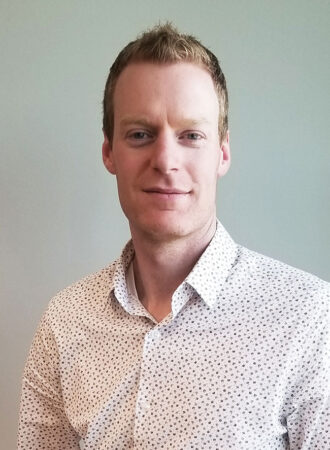 Tyler Callaghan can thank a family member for having him enter the industry.
Tyler Callaghan can thank a family member for having him enter the industry.
“I had a cousin that worked for Lafarge Cement in Brookfield Nova Scotia. He took me on a four-hour tour and I loved it,” he recalls. “After that I looked for opportunities to work in the concrete and cement industry.”
Today, Callaghan serves as operations manager for Lafarge in Alberta. He is responsible for production logistics, quality and engineering for the Greater Calgary Area and Central Alberta markets. He is also a member of the Concrete Alberta Board of Directors and was elected president of
Concrete Alberta in 2023.
“I have a passion for engineering and material design. I truly enjoy being given a challenge by a customer and finding a material solution,” he says.
He first joined Lafarge as a summer student in 2008 as a quality control/assurance technician in the field working with materials and customers. In 2010 he graduated from the University of New Brunswick with a civil engineering degree specializing in concrete and cement chemistry. He relocated to the Calgary market in 2011 when he took on the role of quality manager for Lafarge. During this time, he worked with the University of Calgary on the emerging low carbon cement that was being launched into the North American markets as
Portland Limestone Cement.
“Ready Mix Concrete is a very versatile material. It can be used from roadways to high rises and it is great to be involved in such a wide range of projects,” he says.
At this same period, Callaghan added the Edmonton and Vancouver market areas to his quality manager portfolio. In 2017, he took on the role of commercial manager for Lafarge in the Greater Calgary Area, looking after all sales and customer portfolios until his promotion in 2021.
He recommends people consider a career in construction as the industry provides tangible rewards for those in it.
“Construction and construction materials have the unique position to improve and build upon our communities around us,”
he says.
Dale Furber
Area General Manager
Heidelberg Materials
Vancouver Island, B.C.
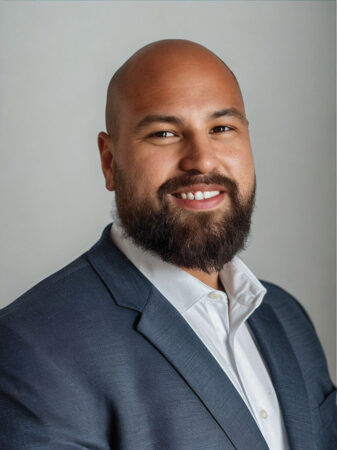 Dale Furber’s identity was football.
Dale Furber’s identity was football.
“As a kid, all you think about is sports. You spend a lot of time building your identity around it,” he says.
Furber found football when his family moved to Canada from Singapore in 2000. The sport led him to play on the offensive line at the University of Saskatchewan and then Simon Fraser University. In 2012, he signed with the Calgary Stampeders in the CFL. However, his path in life was not meant to.
“I got to the next level, and my career didn’t turn out how I wanted it or dreamed it would be,” he explains.“By the time you are 24 or 25, you are ‘retired.’ There is so much life to live still. It’s just odd coming to terms with what is next.”
He thought his next phase was sports management and considered striving to be general manager of a team.
“However, I wasn’t willing to grind out in that industry anymore,” he says.
As he wrestled with the next phase in is life, his career took a different turn. At the time, he was working in finance for Sun Life when a new path opened up.
“I got into the industry after a friend referred me to an opportunity to truck. What started as a means to make cash to support and grow my book of business in finance became my full-time job,” he explains.
He joined in Heidelberg Materials in 2019 and admits, at times, he is still surprised at what he’s doing.
“This wasn’t the industry I ever thought I would find myself in 10 or 15 years ago. Not too many kids or college students think, ‘I want to be crushing aggregates!’ This is the industry I want to stay in moving forward, for sure,” he says.
In his current role, Furber is on the front line of sustainability. Heidelberg Materials Depot repurposes 150,000 tons of concrete, asphalt and other construction waste each year. The material is screened, processed and repurposed for construction use. This has reduced the need for virgin materials and decreased greenhouse gas emissions.
“Our business model supports the circular economy. We create spec material from construction waste. As virgin material is increasingly far from city centers, these urban quarries where we repurpose the material are crucial in building our future,” he says. “Our industry is currently facing a great challenge in reducing its carbon intensity. Solving that problem and changing how we build in the future is crucial. I want to be a leader in that space and an agent of change.”
For Furber, it’s the lessons he learned on the football field that have helped him find success in this industry.
“I brought my competitive mindset and team-first attitude and ended up being GM, just not of a sports team. So, I guess that dream of building a team did come to fruition after all.”
Mike McRoberts
Estimator and Project Manager
Seeley and Arnill Construction
Durham, Ont.
 There isn’t one specific project Mike McRoberts can point to as his most memorable in his career.
There isn’t one specific project Mike McRoberts can point to as his most memorable in his career.
Every project seems to bring with it a sense of accomplishment, he explains.
“Over 11 years of managing projects it’s hard to narrow it down to just one project that I would be most proud of as every one of them has had its truly ‘feel good’ moments. And with every successful project there is always that feeling of accomplishment at the end,” he says.
If he was to pick just on project though, he says it would be his involvement in constructing a 160,000-square-foot commercial grow facility in Ontario.
“I was responsible for overseeing all the civil construction of the build and even had the opportunity to general manage and construct a small addition attached to the facility.”
McRoberts first entered the construction industry as a flagger/labourer.
“{I was} replacing culverts along Highway 6 on one of our (Ontario Ministry of Transportation) projects we had at the time,” he recalls. “When I returned home halfway through my second year in college, my options were, as my father would say, ‘you’re either going back to school or going to work. One or the other.’ Fortunately, I am very proud to say I made the right decision. Straight to work I went.”
He enjoys the variety of work involved in his current role.
“The most satisfying part of my position with Seeley and Arnill Construction is truly having the opportunity to be so heavily involved with everything from small day to day operations, dealing with and directing personnel, estimating small to very large projects, project managing all those same projects, networking with all the other professionals in the industry and probably most important, sharing all of that experience with a fourth-generation family-owned and -operated business,” he says.
Blake Arnill, operations manager with Seeley and Arnill, says McRoberts has managed around $100 million worth of various projects.
“Mike thinks and acts like an owner in all aspects of the operations here at Seeley and Arnill,” adds Arnill. “It is very hard to find a person that has learned from the ground up in this day of age. It wasn’t school that taught Mike. It was his work ethic.”
McRoberts days early in his career he was given advice that has stuck with him – make a decision.
“Spend the time needed to properly calculate the pros and cons in order to make that decision but always decide something oppose to nothing,” he recalls. “At least then, you have an honest 50/50 chance at being wrong versus a zero chance of being right. For whatever reason, that saying stuck with me throughout my career and I have found myself repeating the same line to many young enthusiastic up and comers.
“In today’s industry, things move extremely quickly and can certainly be stressful at times. But if you can maintain composure under pressure, measure twice before you cut and never be afraid to make a decision, you’ll inevitably stand out to those who are watching and excel your career on path you can bet on being proud of one day.”
Warren Andersen
Civil Manager
Lafarge
Vancouver, B.C.
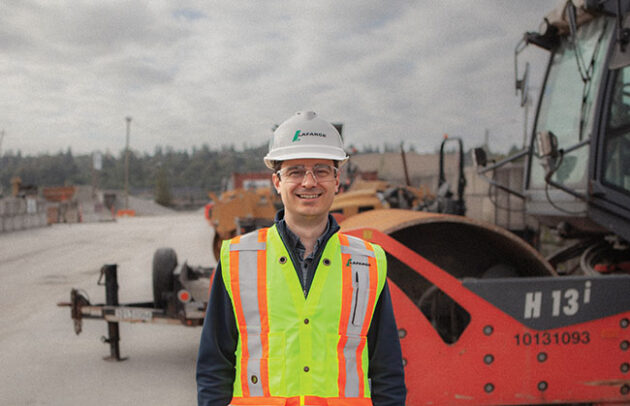 Warren Andersen has always been interested by how things are built.
Warren Andersen has always been interested by how things are built.
“I entered the industry out of a fascination with how things are constructed. For me, the civil engineering and construction industry is exciting as it allows me to witness the transformation of ideas into tangible roadways and structures,” he says.
Andersen currently serves at Lafarge as civil manager in Vancouver.
His career with Lafarge began 15 years ago as a co-op student in Civil Engineering from UBC. Since then, he has held a variety of roles in the company, including quality control for asphalt, aggregates and concrete, engineering technician, and multiple levels of estimating for civil construction projects and roadworks. He has worked in communities across Western Canada, but the past decade has been based in Vancouver.
Five years ago, he was named estimating manager and lead a team bidding on projects ranging from $50,000 to more than $10 million.
“These projects included smaller commercial ventures as well as municipal and provincial roadworks, where we operate as the general contractor,” he explains.
Last year, Andersen was promoted to civil manager. This resulted in his responsibilities broadening so that he was overseeing both estimating and operations, along with managing the financial performance of the Civil Construction Division.
“It is rewarding for me to be a part of a project from inception, at the tendering period, and seeing it through to completion,” Andersen says. “Seeing a project progress through each stage offers personal fulfillment as I get to witness firsthand what each project team can overcome and drive the project success.”
Andersen says he is always looking for opportunities to expand his knowledge and skills. As a result, he has earned his professional engineering designation and is currently working toward his Project Management Professional Designation.
“Being part of an industry that provides extensive learning opportunities and fosters collaboration focused on improving the areas we live in is immensely rewarding to me,” he says.
He tells those entering the industry to jump at any chance to learn.
“There is a wealth of knowledge to absorb and the more you can learn early in your career the stronger your foundation will be for future success,” he says.
Bader Diab
Site manager
Dufferin Aggregates, a CRH Company
Cambridge, Ont.
 Bader Diab has simple advice for those entering the aggregate industry: stay curious.
Bader Diab has simple advice for those entering the aggregate industry: stay curious.
“And always ask questions,” adds the Dufferin Aggregates site manager. “Learn as much as you can about all aspects of the operation. Embrace safety and prioritize teamwork, as collaboration is key in this industry. Lastly, be open to adapting to new technologies and methodologies, as the industry is evolving rapidly.”
Diab says he pursued a Bachelor in Mineral Resources Engineering because he was drawn to the balance between natural resource extraction and sustainability.
“I was intrigued by the industry’s role in building roads, bridges, and other essential structures which made it clear to me that I could contribute to significant projects and shape the way our world is built,” he explains.
Alex Caruana, with Polydeck, says Diab is always looking to make the sites he looks after better places for staff, customers and his employer.
“Having worked with Bader through a variety of difficult applications, I can personally say that his analytical approach, combined with his relentlessly positive attitude, is a great example of what it takes to succeed in aggregate production,” he states.
Diab says he enjoys the dynamic nature of his job.
“Every day presents new challenges, whether it’s optimizing production processes, ensuring safety standards, or collaborating with a diverse team,” he says. “I also take pleasure in seeing the direct results of our efforts — knowing that the materials we produce are essential for large scale projects that improve everyday lives.”
One area Diab is focused on his mentorship and development. He likes to watch people grow in their roles and take on new challenges.
“Seeing their confidence and skills evolve not only strengthens our operation but also fosters a positive workplace culture. It’s fulfilling to know that I can play a part in shaping the next generation of leaders in the industry,” he says.
Dylan Treadwell
President
Cold Sky Consulting Inc.
Canmore, Alta.
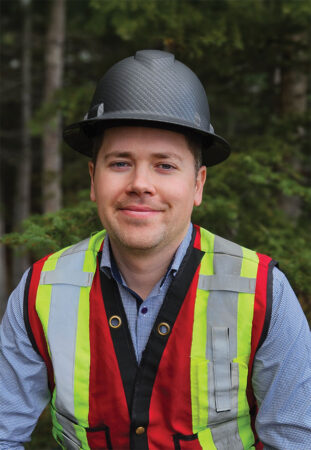 Dylan Treadwell has worked every aspect of the quarry business.
Dylan Treadwell has worked every aspect of the quarry business.
“Including production, maintenance, drill and blast, environmental and sustainability, QA/QC, product development, health and safety, permitting, reserves and resource estimation, mine planning, exploration, pretty much the whole gamut,” he says. “I get a feeling that I really own the projects that I work on from start to finish and that gives great satisfaction.”
His career began with Boral Construction Materials in Australia after he graduated as a mining engineer.
“I was lucky enough to come on at the time when they were commissioning their new Peppertree Quarry. Since production was not quite in full swing, I was given a lot of freedom to get deep into everything from pit design and optimization, from crawling through crushers, screens and conveyors to helping lay out and load shots and running production shift crews,” he recalls. “I had long term plans to eventually switch to a more traditional mining job but I couldn’t, and still can’t now. It was certainly a matter of falling into the industry, but it has been good to me and I have no plans to leave it.”
Today, he is the founder and director of Cold Sky Consulting Inc., where he offers specialized advice to quarries and small mines producing aggregates, sand and gravel, cement and industrial minerals. He is also the North American mining and operations manager for Fertoz International Organics Inc., focused on the development of small mines in British Columbia for organic fertilizer.
He’s interested in the industry’s current transition to reduce carbon emissions. He notes carbon reduction was once seen as an afterthought but is now on the forefront of decision-making.
“I have seen a massive shift in this since the start of my career,” he says. “I have worked closely with manufacturers that are making great strides in their technologies and challenging the current paradigm. This is also a large part of the reason that I work with Fertoz, where we are producing a more sustainable phosphate-based fertilizer.”
When asked if there is a specific project in his career that stands out, he thinks back to his time as a quarry manager at a small, regional quarry in Australia.
“The fixed crushing system was barely functional, the quarry was running out of available rock to blast and it was not making enough money to survive on contract crushing, despite having solid product orders,” he remembers. “I worked with the team on site and looked at various options.”
Eventually, he says they realized they either had to ‘go hard or go home.’ They went hard.
“We blasted a year’s worth of rock in an area that was traditionally challenging. We fixed the screening portion of the fixed plant and supplemented it with high capacity rented mobile crushers. We put up stock as quickly and efficiently as we could, finishing a year’s worth of crushing in months while lowering the unit cost. Within a few months and with the product orders being fulfilled, the quarry was back to being profitable and had a plan for future years.”
Whether you are new to the industry or serving in senior management, Treadwell’s advice is the same: get dirty and don’t be afraid to ask.
“The best way to learn or to understand a situation is to be there, in the field, hands on and talking to people,” he says. “Go unblock a crusher, clean off a blinded screen, clip a torn belt, drive on a rutted haul road – and you will find yourself asking why this happening and start looking for solutions. Have a healthy curiosity of why things are done the way they are, but also don’t be afraid to challenge that – that is how sites and industries grow and progress.”
Print this page